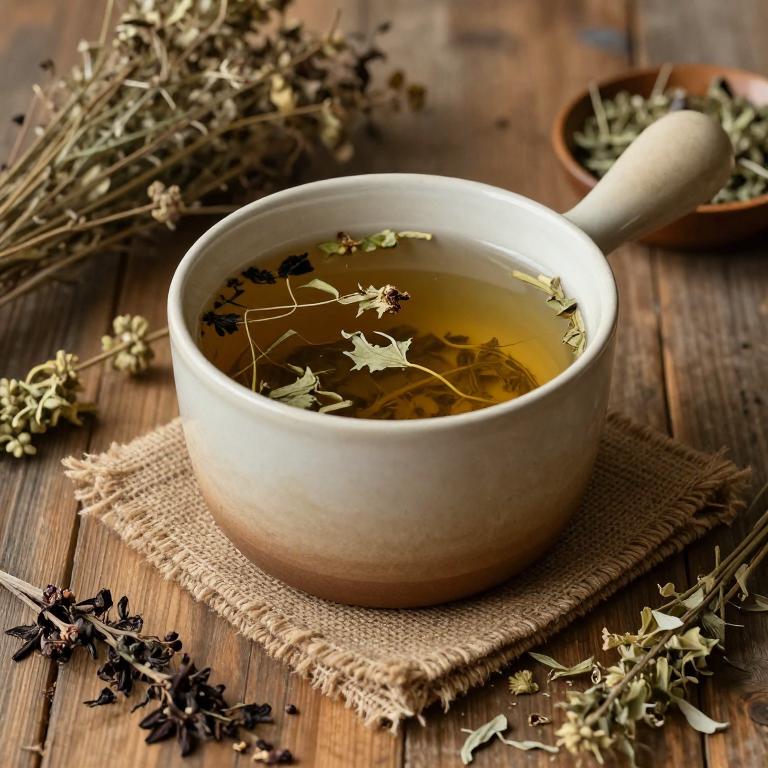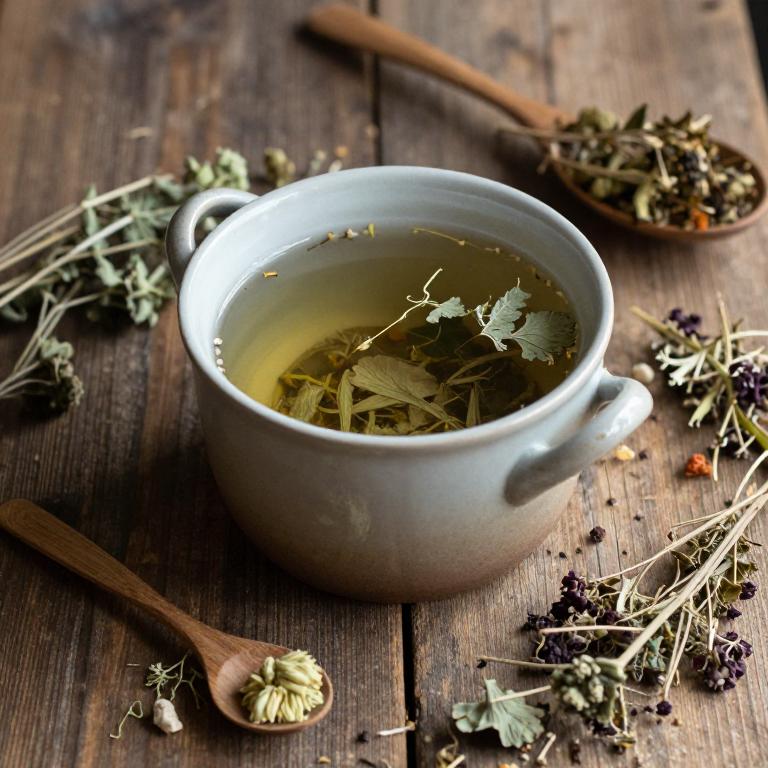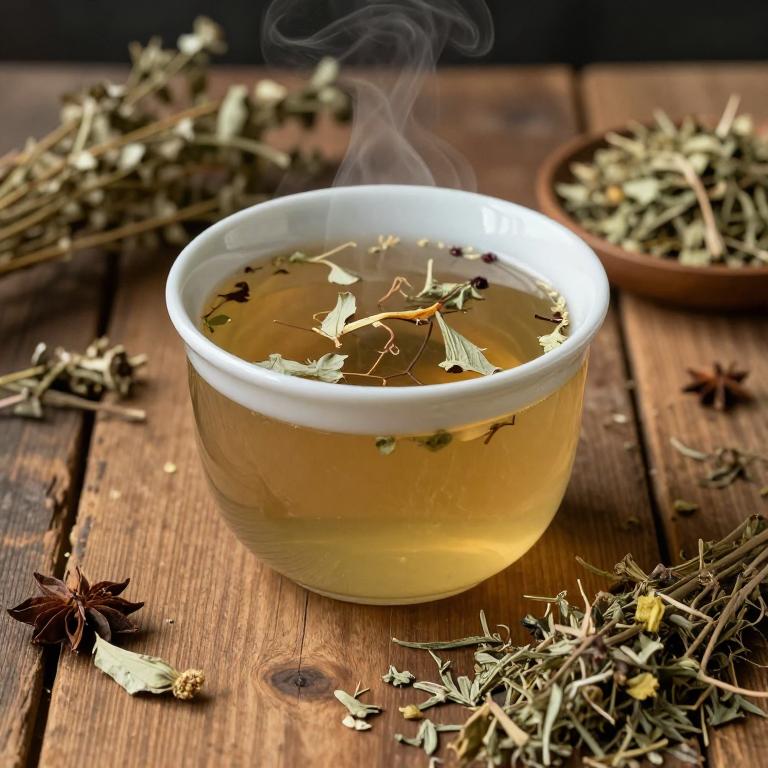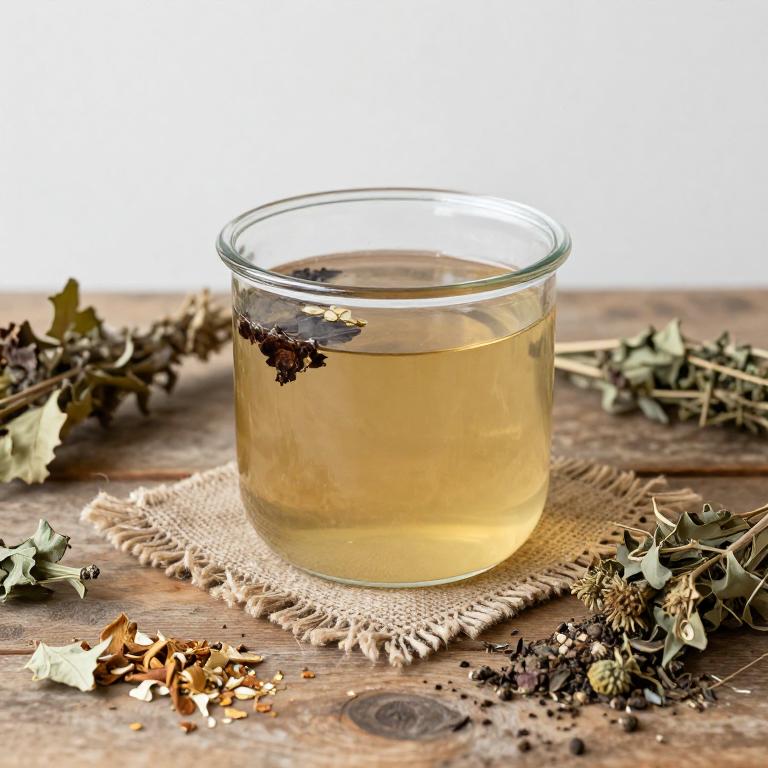10 Best Herbal Decoctions For Motion Sickness

Herbal decoctions have been traditionally used to alleviate symptoms of motion sickness, with several plants known for their calming and nausea-reducing properties.
Common herbs in these decoctions include ginger, peppermint, and chamomile, which are believed to soothe the digestive system and ease inner ear disturbances. To prepare a decoction, the dried herbs are simmered in water for an extended period, allowing the active compounds to infuse into the liquid. This method is often preferred for its gentle and natural approach, making it suitable for individuals seeking non-pharmacological remedies.
While herbal decoctions can be effective for mild cases, it is advisable to consult a healthcare professional for more severe or persistent symptoms.
Table of Contents
- 1. Ceylon cinnamon (Cinnamomum verum)
- 2. Ginkgo (Ginkgo biloba)
- 3. Black pepper (Piper nigrum)
- 4. Ginger (Zingiber officinale)
- 5. Dill (Anethum graveolens)
- 6. Chaste tree (Vitex agnus-castus)
- 7. Nardostachys jatamansi (Nardostachys jatamansi)
- 8. Peppermint (Mentha piperita)
- 9. Licorice (Glycyrrhiza glabra)
- 10. Cumin (Cuminum cyminum)
1. Ceylon cinnamon (Cinnamomum verum)

Cinnamomum verum, also known as true cinnamon, has been traditionally used in herbal medicine for its potential to alleviate symptoms of motion sickness.
When prepared as a herbal decoction, cinnamon is believed to help soothe the digestive system and reduce nausea by calming the inner ear and central nervous system. The aromatic compounds in cinnamon may also help distract the senses and ease the disorienting effects of motion. To prepare the decoction, a teaspoon of ground cinnamon is typically steeped in hot water for several minutes before consumption.
While some studies suggest that cinnamon may have mild anti-emetic properties, it is advisable to consult a healthcare provider before using it as a remedy for motion sickness, especially for individuals with underlying health conditions.
2. Ginkgo (Ginkgo biloba)

Ginkgo biloba, a traditional herbal remedy, has been explored for its potential to alleviate symptoms of motion sickness due to its circulatory and cognitive-enhancing properties.
Herbal decoctions made from ginkgo leaves are believed to improve blood flow and reduce nausea by supporting the nervous system's response to motion-induced stress. While some studies suggest that ginkgo may help with dizziness and fatigue associated with motion sickness, more rigorous clinical trials are needed to confirm its efficacy. Typically, the decoction is prepared by simmering the dried leaves in water for several hours, then consumed in small doses before travel.
Despite its historical use, it is important to consult a healthcare provider before using ginkgo biloba, as it may interact with certain medications or cause side effects in some individuals.
3. Black pepper (Piper nigrum)

Piper nigrum, commonly known as black pepper, has been traditionally used in herbal medicine for its potential to alleviate symptoms of motion sickness.
The active compound, piperine, may help improve digestion and stimulate the nervous system, which could theoretically reduce nausea. While there is limited scientific research specifically on black pepper decoctions for motion sickness, some anecdotal evidence suggests that its aromatic properties may help ease the discomfort associated with motion sickness. Herbal decoctions made from black pepper are typically prepared by simmering the dried fruit in water, and they are often consumed in small quantities before or during travel.
However, it is important to consult with a healthcare provider before using any herbal remedy, especially for individuals with pre-existing medical conditions or those taking medications.
4. Ginger (Zingiber officinale)

Zingiber officinale, commonly known as ginger, has been traditionally used to alleviate symptoms of motion sickness due to its potential anti-emetic properties.
Herbal decoctions made from fresh or dried ginger roots are often prepared by simmering the root in water to extract its active compounds, such as gingerols and shogaols. These compounds may help reduce nausea by influencing the central nervous system and gastrointestinal motility. Studies suggest that ginger decoctions can be effective in preventing motion sickness when consumed before and during travel.
However, it is advisable to consult a healthcare professional before using ginger as a remedy, especially for individuals with certain medical conditions or those taking medications.
5. Dill (Anethum graveolens)

Anethum graveolens, commonly known as fennel, has been traditionally used in herbal medicine for its potential to alleviate symptoms of motion sickness.
The seeds of this plant contain compounds such as anethol and fenchone, which may help in reducing nausea and vomiting by calming the digestive system and soothing the inner ear. A decoction made from fennel seeds can be prepared by simmering the dried seeds in water for several minutes, allowing the active compounds to be extracted. This herbal remedy is often consumed in small quantities before or during travel to prevent motion sickness.
While anecdotal evidence supports its use, more scientific research is needed to fully understand its efficacy and safety for this specific application.
6. Chaste tree (Vitex agnus-castus)

Vitex agnus-castus, commonly known as chasteberry, has been traditionally used in herbal medicine for its potential effects on the nervous system and hormonal balance.
While it is more widely recognized for treating menstrual disorders and menopausal symptoms, some studies suggest it may also have a calming influence on the central nervous system, which could theoretically help alleviate symptoms of motion sickness. Herbal decoctions made from vitex agnus-castus are typically prepared by simmering the dried berries in water for several minutes, and they are often consumed before traveling to potentially reduce nausea. However, scientific evidence directly supporting its efficacy for motion sickness is limited, and more research is needed to confirm its role in this specific context.
As with any herbal remedy, it is advisable to consult a healthcare professional before use, especially for individuals with pre-existing medical conditions or those taking other medications.
7. Nardostachys jatamansi (Nardostachys jatamansi)

Nardostachys jatamansi, commonly known as Jatamansi, is a traditional Himalayan herb that has been widely used in Ayurveda and Tibetan medicine for its calming and sedative properties.
Its herbal decoctions are believed to help alleviate symptoms of motion sickness by reducing anxiety and nausea through its soothing effects on the central nervous system. The active compounds in Jatamansi, such as flavonoids and alkaloids, may play a role in regulating the body's response to motion-induced stress. Some studies suggest that its antiemetic properties can help ease vomiting and dizziness associated with motion sickness.
However, more clinical research is needed to fully understand its efficacy and safety in treating this condition.
8. Peppermint (Mentha piperita)

Mentha piperita, commonly known as peppermint, has been traditionally used in herbal medicine to alleviate symptoms of motion sickness.
Peppermint herbal decoctions are prepared by steeping the dried leaves and stems in hot water, creating a soothing and aromatic tea. The active compounds in peppermint, such as menthol and menthone, are believed to help reduce nausea and calm the digestive system. Studies suggest that the cooling effect of peppermint may help ease the sensation of queasiness associated with motion sickness.
While peppermint decoctions are generally considered safe for most adults, they should be used with caution in children and individuals with certain medical conditions.
9. Licorice (Glycyrrhiza glabra)

Glycyrrhiza glabra, commonly known as licorice root, has been traditionally used in herbal medicine for its soothing and anti-inflammatory properties.
Herbal decoctions made from glycyrrhiza glabra are sometimes employed to alleviate symptoms of motion sickness, such as nausea and vomiting, due to its potential to calm the gastrointestinal tract. These decoctions typically involve simmering the dried root in water to extract its active compounds, including glycyrrhizin and flavonoids. While some studies suggest that licorice may help reduce nausea, more research is needed to confirm its efficacy specifically for motion sickness.
As with any herbal remedy, it is important to consult a healthcare professional before use, especially for individuals with hypertension or kidney conditions.
10. Cumin (Cuminum cyminum)

Cuminum cyminum, commonly known as cumin, has been traditionally used in herbal medicine for its digestive and aromatic properties.
When prepared as a decoction, cumin can help alleviate symptoms of motion sickness by soothing the gastrointestinal system and reducing nausea. The essential oils in cumin, such as limonene and carvone, are believed to have calming effects on the central nervous system. To prepare the decoction, fresh or dried cumin seeds are simmered in water for several minutes, then strained and consumed before or during travel.
While some anecdotal evidence supports its use, more scientific research is needed to confirm its efficacy for motion sickness.